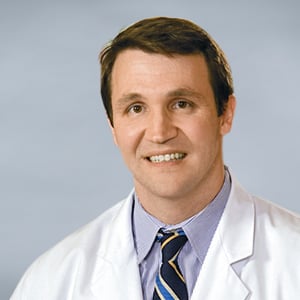Thyroid eye disease (TED) is a rare autoimmune disease associated with thyroid dysfunction. Though more common with hyperthyroidism (or “Graves disease”), TED can also occur with hypothyroidism, Hashimoto’s thyroiditis (inflammation of the thyroid gland), or even be present before your doctor diagnoses any thyroid dysfunction. The symptoms and signs of TED can range in severity from mild eye irritation to a disfiguring eyelid and eye socket inflammation that has the potential to cause blindness.
TED can be very unpredictable and the progression varies from person to person. Once you have had thyroid disease, regular eye exams are important as changes can continue to occur years after hormone levels have stabilized.
Symptoms of thyroid eye disease
- Irritation of the ocular surface
- Redness
- Discharge
- Pressure on or around the eyes
- Swelling of the eyelids and cheeks
- Double vision
- Blurred vision
How is thyroid eye disease diagnosed?
The presentation of TED can range from extremely subtle to vision threatening. TED can be frustrating in that it can present even before you are formally diagnosed with a thyroid problem. As board certified ophthalmologists fellowship trained in oculoplastic surgery, we have been trained to detect findings associated with TED. They will recommend you see your primary care physician or an endocrinologist and will generate a consultation report recommending the necessary workup to evaluate your thyroid. You may be sent for a CT scan or MRI to evaluate the effects of TED on your eye socket.
How is thyroid eye disease treated?
Most patients who develop thyroid eye disease will require only supportive care while their medical team works to stabilize any thyroid dysfunction. Artificial tears, cool compresses, and sleeping with the head elevated can help with irritation and with swelling. In more severe cases the active form of the disease is treated with immunosuppressive medications (typically steroids) and sometimes, low dose radiation treatments. More recently, a medication Teprotumumab has been approved for the treatment of active TED. It is vital that if you smoke that you work with your primary care physician to stop smoking as quickly and as safely as possible as it has been shown that smoking worsens TED.
Once the thyroid functions are stable for some time (generally 6 months) the function and appearance of the eyelids and tissues around the eyes can usually be improved by reconstructive and cosmetic eyelid or orbital surgery. The particular surgical technique recommended will depend on the type and severity of the eye problems.
Orbital decompression involves the removal of a portion of the bone and/or fat behind the eye. This is done for patients who have eyes that have been pushed forward from the eye socket due to swelling from TED. This may be recommended for vision and/or cosmetic concerns.
Misalignment of the eyes and double vision can be improved with Eye Muscle Surgery to reposition the enlarged muscles that control eye movement. We work with strabismus surgeons outside of OCLI to address any double vision you may have related to TED.
Finally, eyelid surgery can be performed to adjust the position of retracted lids to improve eyelid closure and restore eyelid function. Removal of excessive fat from the eyelids can also improve their appearance.
If you have thyroid disease or think you may be having symptoms from TED, contact OCLI for your consultation today.
How is thyroid eye disease treated?
Most patients who develop thyroid eye disease will require only supportive care while their medical team works to stabilize any thyroid dysfunction. Artificial tears, cool compresses, and sleeping with the head elevated can help with irritation and with swelling. In more severe cases the active form of the disease is treated with immunosuppressive medications (typically steroids) and sometimes, low dose radiation treatments. More recently, a medication Teprotumumab has been approved for the treatment of active TED.
It is vital that if you smoke that you work with your primary care physician to stop smoking as quickly and as safely as possible as it has been shown that smoking worsens TED.








